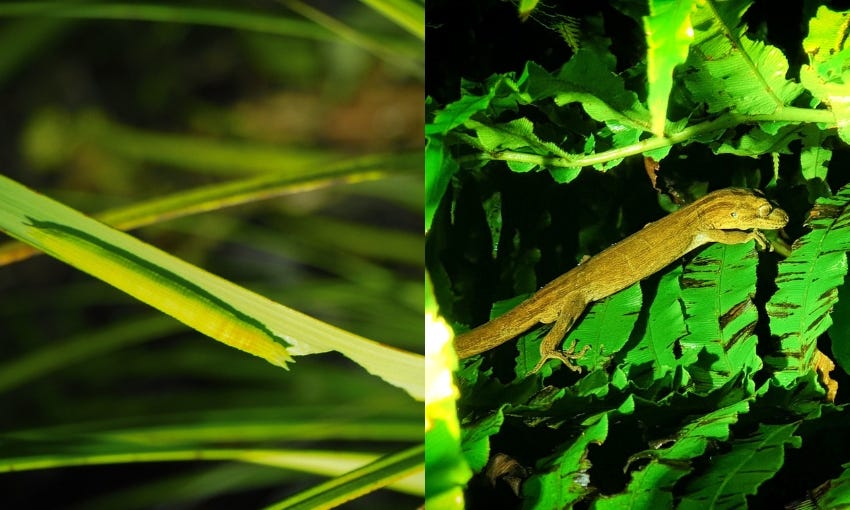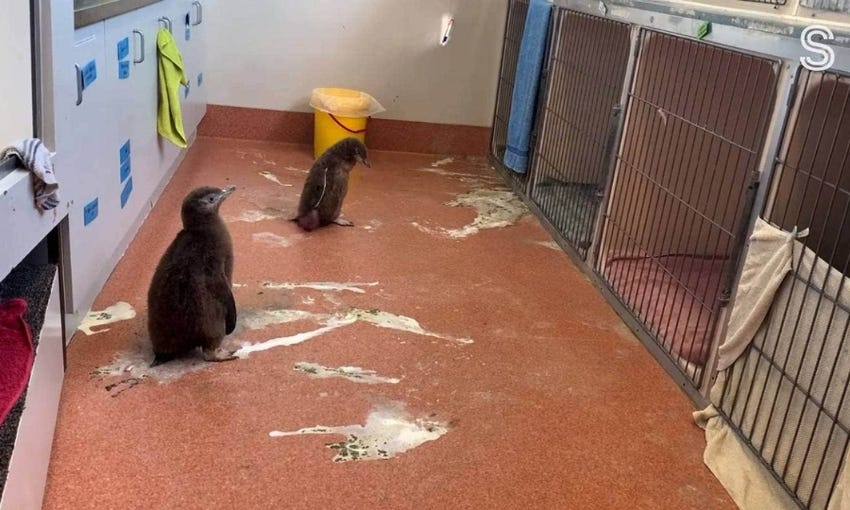On the predator-free frontlines in the Coromandel
Pest control at Mahakirau Forest Estate, “a crown jewel in the Coromandel Ranges”, is serious business.
Kia ora, welcome to Future Proof, brought to you by Electric Kiwi.
Two rare critters that make their home at Mahakirau Forest Estate. Left: it might not look like much, but this is the caterpillar of the rare forest ringlet butterfly. Right: the northern striped gecko. Image credit: Ellen Rykers.
The Mahakirau Forest Estate is not your average subdivision. Enter through its tall gates and you’ll be greeted by lush forest and predator traps. Lots and lots of predator traps – one every few metres along the roadside. These 600 hectares of Coromandel bush are home to rare and endangered native wildlife, as well as a community of people dedicated to protecting the ecosystem from the ravages of introduced predators.
Jude and Tim Hooson didn’t know anything about predator control before moving here 20 years ago, but the duo have become experts. They’re part of the Mahakirau Forest Estate Society, which started with a programme to target stoats and possums. Then they moved onto rats. “This transformed things. Now we see all the seed on the ground and a lot more insect life,” Tim and Jude say. But it’s an ongoing battle – there’s constant reinvasion – and the estate now runs a programme targeting 12 pest species.
On a day walk, Tim and Jude traipse through the bush with bait bucket in hand, refreshing bait stations and checking traps. They still catch lots of stoats and ferrets. “We don’t have a bigger problem than anyone else, we’ve just got really good at catching them,” Jude explains.
Because there’s a lot to protect here. Mahakirau used to be a farm, and the Hoosons say it’s been “seriously cool” to see the bush regenerate. Resident wildlife includes three “icon” species: the Coromandel northern striped gecko, Archey’s frog and forest ringlet butterfly.
On a night walk through the bush, we spot an array of critters including the three icons. A couple of years ago, a butterfly expert visited the estate in search of the forest ringlet. He’d spent three months searching elsewhere and had yet to see a single butterfly, but at Mahakirau he saw five. “We thought, ‘wow, we could be the last stronghold’. There was a real sense of excitement but also trepidation and responsibility,” says Tim.
“When you see the effects of conservation, it just hooks you,” says Jude. She’s now the chief executive of the Predator Free Hauraki Coromandel Community Trust, a collective of around 60 community groups working to make their patch predator free. The Trust is linking up all this effort into one big landscape-scale project. So could we one day see the Coromandel Peninsula predator free? With people like Jude and Tim on the frontline, I’m hopeful.
With the sun shining, you may be considering the benefits of solar - reducing your power bills and generating renewable energy at home.
Check out Electric Kiwi’s helpful FAQs page and if you decide solar’s for you, their MoveMaster plan comes with a sweet 12.5c/kWh feed-in tariff along with cheaper off-peak prices and half price overnight power (11pm to 7am).
Plus, Electric Kiwi customers get a special deal with solar installation company ZEN Energy, who are offering a $750 discount on the standard GST inclusive price of their solar systems, including battery and non-battery.
Why gas stoves are making headlines around the world
In the US, a red-hot debate fired up over the future of gas stoves after an official from the US Product Safety Commission dubbed gas a “hidden hazard” pumping out indoor air pollution, and suggested a ban might be appropriate. This prompted outrage among conservatives. “The episode shows the challenge of trying to alter personal routines in dealing with environmental crisis,” Oliver Milman wrote on The Guardian. The Spinoff’s Charlotte Muru-Lanning has a homegrown take on the issue and speaks to chefs about gas versus other cooking methods such as induction. Over on Heated, Emily Atkin argues that gas stoves are like plastic straws: they’re an easy “in” to start discussing an overlooked climate problem.
90% of carbon offsets worthless
A new investigation finds that carbon offsets from the world’s biggest offset provider are worthless and may be making global heating worse. This comes as fossil fuel corporation Shell plans to spend a whopping $450 million on offsets, despite their stated strategy of “avoid, reduce and only then mitigate” placing offsets as a last resort.
What’s next for the climate under our new PM?
ICYMI, yesterday’s Bulletin summarises outgoing prime minister Jacinda Arden’s climate achievements, and what we can expect with new PM Chris Hipkins at the helm. Stuff’s Eloise Gibson and Olivia Wannan lay out the wins, fails and unfinished business as we approach this year’s election.
More stories:
Stuff’s Eloise Gibson ranks New Zealand’s top 10 climate polluters.
In good bird news, there are now six kākā nests in Abel Tasman National Park (and the chicks are due to fledge any day now). Plus, the first wild kiwi egg in more than a century has been laid in Wellington.
Yes, the zombie fungus from The Last of Us is real. But can it control humans? National Geographic has the answers.
This company can recycle anything with a plug – and in 2022, it handled 2.5 million kg of New Zealand’s e-waste.
New tracking data could add manta rays to New Zealand’s list of native species.
Menus with climate labels lead people to make more sustainable food choices, according to new research.
New Zealand needs an e-bike rebate. The Spinoff’s Tommy de Silva explains why.
Image credit: The Wildlife Hospital – Dunedin.
To finish this edition, meet a pair of penguin party animals. Two hoiho chicks at Dunedin’s Wildlife Hospital escaped their lodgings and caused a “poonami” overnight, Hamish McNeilly reports for Stuff. Writing on Facebook, hospital staff said, “These two naughty mischiefs had an amazing time and got up to heaps of shenanigans overnight … Our awesome volunteer had a less terrific time cleaning up after these two wee rat bags!”
Hope you have a poo-tiful week (and half as much fun as these rascals),
Ellen
Got some feedback about Future Proof or topics you’d like covered? Get in touch with me at futureproof@thespinoff.co.nz














